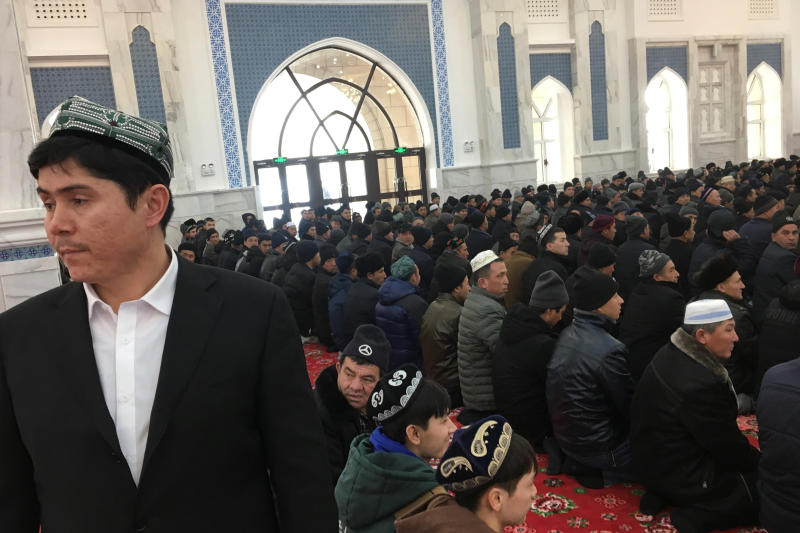China passes five-year plan to sinicise Islam, as Beijing tightens grip on major faiths in China
Sign up now: Get insights on Asia's fast-moving developments

Men pray at a mosque at the Xinjiang Islamic Institute during a government organised trip in Urumqi, Xinjiang Uighur Autonomous Region, China, on Jan 3, 2019.
PHOTO: REUTERS
BEIJING - China has passed a five-year plan to make Islam more Chinese, even as it faces withering criticism for the large-scale detention of Muslims in Xinjiang.
The plan aims "to guide Islam to be compatible with socialism and implement measures to sinicise the religion" so as to foster patriotism.
It was adopted last week by the United Front Work Department, the Chinese Communist Party agency overseeing religion, following a meeting with representatives of local Islamic associations from eight provinces and regions, The Global Times reported.
Little else is known about the plan, but an outline of a five-year plan for Christianity released last year hints at the measures in the pipeline for Islam.
The outline said that foreign elements and Christianity's "tether" to the West should be eliminated.
Besides spreading the gospel, sermons should also promote socialism, as well as socialist theories like President Xi Jinping's "Four Confidences", which refers to confidence in its chosen path, political system, guiding theories and culture. Churches should also integrate Chinese architectural styles, it added.
The plan on Islam is the latest in a series of steps taken by the central government in recent years to tighten its grip on major faiths in the country, amid a religious revival with more young Chinese identifying themselves as religious.
There are similar plans for all five state-recognised religions - Buddhism, Taoism, Islam, Catholicism and Christianity.
For example, a five-year plan to guide the development of Buddhism will also be key work for the Chinese Buddhist Association in 2019, it was announced at a symposium held on Monday (Jan 7) by China's Parliament with national and grassroots religious leaders.
President Xi's campaign to sinicise religions officially began with a 2016 speech at a national conference on religion. He said then that the party needs to "actively guide those (who are) religious to love their country, protect the unification of their motherland and serve the overall interests of the Chinese nation".
In particular, Beijing has long been concerned about the influence of extremist Islamic terrorist groups on the Uighurs in its autonomous region of Xinjiang.
In recent months, China's clampdowns on the Muslim minority has drawn condemnation from Western countries such as France, Germany and the US.
Last month, three mosques were closed in south-western Yunnan after the authorities said that they provided illegal religious education, sparking a clash between worshippers and the People's Armed Police. A 34-year-old Arabic school in Gansu was also shuttered after officials said it did not have the correct permits.
Last October, China amended its laws to legitimise its detention of Uighurs in Xinjiang, after earlier denying the existence of such detention camps.
The United Nations said in an August report that up to one million Uighurs are being detained in "re-education camps". Its top human rights official said last month that her office was seeking direct access to the region to verify these reports.
Beijing has said its security measures are needed to combat the influence of extremist groups that incite violence there, and that the camps are vocational training schools.
On Monday, the Chinese Foreign Ministry said that UN officials are free to visit Xinjiang, provided they meet certain conditions.
"(They should) refrain from interfering in others' internal affairs or undermining others' sovereignty," said ministry spokesman Lu Kang at a regular press briefing.
Experts said Beijing's latest move represents a further curtailment of religious freedoms, and President Xi's drive to consolidate power and control across various spheres including business and the military.
Mr Xi's campaign to sinicise religions also shows his administration's wariness of religion's power to mobilise the masses, said National University of Singapore political scientist Chong Ja Ian.
"The Chinese Communist Party fears that Islam can have a strong sway on its believers and that a certain segment of its believers are willing to act in militant ways, even though that's a very small segment of all Muslims," he said.
"But the perception looms large in Beijing's mind, so terrorism becomes a convenient reason to clamp down hard."
Global Times editor-in-chief Hu Xijin disagreed that there is a clampdown on Islam and Muslims.
"The reality is that religions that enter China cannot transform China, but must adapt to local conditions and undergo a Chinese baptism," he wrote on Weibo in a post that drew over a thousand likes and shares.


